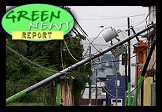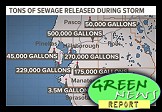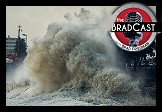


TWITTER: @GreenNewsReport
VIA SMART PHONE: Stitcher Radio!
IN TODAY'S RADIO REPORT: Crisis in Japan: Compounding natural disaster, humanitarian disaster, and spiraling nuclear disaster --- desperate measures to hold off a nuclear nightmare ... All that and more in today's Green News Report!
Got comments, tips, love letters, hate mail? Drop us a line at GreenNews@BradBlog.com or right here at the comments link below. All GNRs are always archived at GreenNews.BradBlog.com.
IN 'GREEN NEWS EXTRA' (see links below): EPA moves to curb toxic mercury pollution; Battle-proof wind farms survive Japan disasters; Op-ed: 'Save US children from toxic mercury'; End of cheap food in US?; Koch Bros: property rights only for polluters; Gov. Kasich (R) wants fracking in OH state parks; Sec. Chu: Clean energy puts U.S. ahead; PA: Coal Exec Given Vast Environmental Authority; WV considering geothermal future; Google backs biofuel startup; If President Obama calls it safe, watch out; Germany's Merkel plans faster shift to clean energy ... PLUS: Irish scientists help Guinness go green...
STORIES DISCUSSED IN TODAY'S 'GREEN NEWS REPORT'...
- VIDEO: Rush Amused That Earthquake Hit Environmentally Conscious Country (MediaMatters.org)
- GOP Votes to Overturn Science:
- House GOP rejects amendment that says climate change is occurring (The Hill)
- Analysis: “The content of carbon dioxide in the atmosphere is accelerating super-exponentially.” (Climate Progress) [emphasis added]:
Recent climate science suggests human civilization is on the precipice. It turns out that a purely mathematical analysis, “Evidence for super-exponentially accelerating atmospheric carbon dioxide growth,” comes to the same conclusion.
...
"Let us hope that the stabilization of the human population will occur endogenously by self-regulation, rather than by more stringent finite carrying capacity constraints that can be expected to lead to severe strains on a significant fraction of the population." - Rep. Burgess (R-TX) cites unscientific online poll as evidence against climate science (Climate Progress)
- Rep. Peter DeFazio says “people will die” from GOP cuts to NOAA, disaster response programs: House GOP still says accurate weather forecasting and hurricane tracking are luxuries America can’t afford (Climate Progress)
- Sen. Jay Rockefeller: Climate science is ‘unequivocally true’ (Wonk Room)
- LATEST DEVELOPMENTS: Natural Disaster, Humanitarian Disaster, Man-Made Disaster in Japan:
- UPDATED Live Coverage of Japan's Nuclear Disaster at BRAD BLOG.COM (BradBlog.com)
- Updated Full Coverage: JAPAN NUCLEAR CRISIS (Kyodo News)
- Updated Full Coverage Page at Reuters (Reuters)
- IAEA Update on Japan Earthquake (International Atomic Energy Agency)
- Facts: Nuclear Power Safety (Union of Concerned Scientists)
- Japanese engineers aim to restore power to avert catastrophe (Reuters):
Japanese engineers worked through the night to lay a 1.5 km (one mile) electricity cable to a crippled nuclear power plant in the hope of restarting pumps desperately needed to pour cold water on overheating fuel rods and avert a catastrophe. - Helicopters dump water on nuclear plant in Japan (CNN)
- U.S. Calls Radiation ‘Extremely High,’ Sees Japan Nuclear Crisis Worsening (NY Times)
- Days later, Japanese still confronting magnitude of quake crisis (CNN)
- Isolated and angry amid Fukushima nuclear crisis: An awful reality is setting in for those trapped near the stricken nuclear plant: People are afraid to help them. (LA Times)
- For one quake survivor, self-help in the face of seeming helplessness: One survivor in Miyagi prefecture has decided not to wait for rescue workers. With a scuba suit on, he waded through flooded streets to rescue his wife, and later his mother. He continues to look for more survivors.(LA Times)
- Scientists Project Path of Radiation Plume (NY Times) [emphasis added]:
Health and nuclear experts emphasize that radiation in the plume will be diluted as it travels and, at worst, would have extremely minor health consequences in the United States, even if hints of it are ultimately detectable. In a similar way, radiation from the Chernobyl disaster in 1986 spread around the globe and reached the West Coast of the United States in 10 days, its levels measurable but minuscule. - EPA deploys more radiation monitors to the West Coast (San Jose Mercury News)
- Radiation from Japan Not Likely to Harm North America (Jeff Masters' Weather Underground)
- No fallout danger to U.S. from Japan-NRC chief (Reuters) [emphasis added]:
The U.S. Nuclear Regulatory Commission believes there is no radiation danger to U.S. territory from the nuclear reactor disaster Japan, NRC Chairman Gregory Jaczko said on Thursday."We don't see any concern for radiation levels that could be harmful here in the the United States or any of the U.S. territories," he told reporters. He said NRC recommended evacuating areas within 50 miles of Japan's stricken reactor as a prudent precaution.
- STATEMENT OF DR. EDWIN LYMAN, SENIOR SCIENTIST, GLOBAL SECURITY PROGRAM: U.S. Senate Briefing on Nuclear Plant Crisis in Japan and Implications for the United States (Union of Concerned Scientists)
- Japan Syndrome: More Background Info
- Doomsday Scenario at Fukushima (Huffington Post Green)
- Danger of Spent Fuel Outweighs Reactor Threat (NY Times):
Years of procrastination in deciding on long-term disposal of highly radioactive fuel rods from nuclear reactors is now coming back to haunt Japanese authorities as they try to control fires and explosions at the stricken Fukushima Daiichi Nuclear Power Station.
...
If recriticality takes place, the uranium starts to warm. If a lot of fission occurs, which may only happen in an extreme case, the uranium would melt through anything underneath it. If it encounters water as it descends, a steam explosion may then scatter the molten uranium. - Reports: Lax oversight, 'greed' preceded Japan nuclear crisis (Christian Science Monitor):
Reports suggest that greed within the worldwide nuclear industry, combined with an insufficient UN watchdog and lax oversight of Japan's nuclear plants, contributed to the Japan nuclear crisis. - Numerous Risks Posed By US Nuclear Reactors (Friends of the Earth)
- How a Reactor Shuts Down and What Happens in a Meltdown (Interactive) (NY Times)
- Japan's Nuclear Emergency Explained (UPDATED) (Mother Jones)
- Q&A: Dangers posed by Japan's quake-hit atom plant (Scientific American)
- NRC: Fact Sheet on Biological Effects of Radiation (US Nuclear Regulatory Commission)
- Global Economic & Political Impact:
- Merkel Switches Off Seven Nuclear Power Plants (Guardian):
Angela Merkel's U-turn on nuclear energy became even more gear-crunching on Tuesday when she announced the temporary closure of seven of Germany's nuclear power stations. - Keith Olbermann: WikiLeaks: Japan Warned About Fukushima (FOK News Channel)
- UN Calls Emergency Meeting as Japan Nuclear Crisis Deepens (Bloomberg)
- As Japan’s nuclear crisis intensifies, China suspends all new nuclear plants (Climate Progress)
- DOE Loan Chief: We Remain Committed to Nuclear (Reuters)
- Disaster in Japan Batters Suppliers (NY Times)
- Japan a Weak Link in the Supply Chain: Setbacks to Japan's industries could disrupt the flow of components to tech and auto companies (Bloomberg)
- Senators ask U.S. to review nuclear plants (Reuters)
- Crisis in Japan may be turning Germany and Italy against nuclear power (Reuters)
- Electricity too lethal to meter: So much for all that new nuclear energy we were going to build (Grist)
- Japan earthquake: Britons told to consider Tokyo exit: The Foreign Office has advised Britons to consider leaving Tokyo and north-east Japan following Friday's quake, tsunami and subsequent radiation fears. (BBC)
- US IMPACT: Earthquake-Prone Nuclear Plants:
- What are the odds? US nuke plants ranked by quake risk (MSNBC):
So much for San Andreas: Reactors in East, Midwest, South have highest chance of damage - Nuclear Energy Advocates Insist U.S. Reactors Completely Safe Unless Something Bad Happens (The Onion, via Climate Progress):
“When you consider all of our backup cooling processes, containment vessels, and contingency plans, you realize that, barring the fact that all of those safety measures could be wiped away in an instant by a natural disaster or electrical error, our reactors are indestructible.” Jaczko added that U.S. nuclear power plants were also completely guarded against any and all terrorist attacks, except those no one could have predicted. - VIDEO: Before Japan disaster, GOP mocked concerns about nuclear safety (MediaMatters.org)
- Taxpayer Meltdown?: Taxpayers, Not Utilities, Liable for Most of the Bill (National Journal)
- Cost, not Japan crisis, should scrub nuclear power (Grist)
- What are the odds? US nuke plants ranked by quake risk (MSNBC):
'GREEN NEWS EXTRA' (Stuff we didn't have time for in today's audio report)...
- E.P.A. Proposes New Emission Standards for Power Plants (NY Times)
The Environmental Protection Agency on Wednesday proposed the first national standard for emissions of mercury and other pollutants from coal-burning power plants, a rule that could lead to the early closing of a number of older plants and one that is certain to be challenged by the some utilities and Republicans in Congress.Lisa P. Jackson, the agency’s administrator, said control of dozens of poisonous substances emitted by power plants was long overdue and would prevent thousands of deaths and tens of thousands of cases of disease a year.
- Battle-proof Wind Farms Survive Japan's Trial by Fire (Huffington Post Green)
- OP-ED: Protect our kids from toxic mercury (Mary Anne Hitt, CNN) [emphasis added]:
A potent neurotoxin especially dangerous to young children, nursing mothers and women of childbearing age, mercury exposure affects a developing child's ability to walk, talk, read, write and learn.Mercury comes from coal-fired power plants, where it rains down into rivers and streams and then contaminates our fish and enters the food chain.
...
The mercury problem in the United States is so widespread that one in six women has mercury levels in her blood high enough to put her baby at risk of development problems, according to the Environmental Protection Agency. - Cheap food may be a thing of the past in U.S. (LA Times):
Americans spend only about 10% of their annual incomes on food, compared with as much as 70% in other countries, but with prices climbing, some economists wonder whether the nation's abundance of affordable food is history. - What The Frack?: Ohio Gov. John Kasich wants to open up state parks for oil and gas drilling (Think Progress)
- Clean energy puts U.S. ahead, Chu says: The U.S. Energy Department needs a holistic approach in researching clean energy if it’s to out-compete the rest of the world, the energy secretary said. (UPI)
- Midsize Solar Installations Grow At Light Speed (NPR)
- What the Frack?: In PA, Coal Exec Given Vast Environmental Authority (Pro Publica)
- West Virginia Considering Geothermal Future (Solve Climate)
- Google Ventures Leads Funding of Biofuels Start-Up (NY Times)
- Angela Merkel Says Wants Faster Shift to Renewable Energy (Reuters)"
German Chancellor Angela Merkel said on Thursday she will present a clear timeline for a faster shift in policy toward renewable energy sources in the light of the Japanese nuclear crisis. - Property Rights And the Kochs (Think Progress):
If I walked over to David Koch’s lawn and tore up all the grass, he’d probably feel that the basic principles of a free market society require me to be punished. After all, that’s his property. And then there’s what happens when the Kochs want to pollute someone else’s river... - Bad energy: If President Obama calls it safe, watch out (Grist)
- Irish scientists help Guinness go green (Grist):
Just in time for St. Patrick's Day, scientists at the University of Limerick have developed a biodegradable alternative to that plastic widget that keeps Guinness foamy.


 Trump's 2024 Scheme; Walz 'Ready to Turn Page' at DNC: 'BradCast' 8/22/24
Trump's 2024 Scheme; Walz 'Ready to Turn Page' at DNC: 'BradCast' 8/22/24 'Green News Report' 8/22/24
'Green News Report' 8/22/24
 The 2024 DNC and 'The Contagious Power of Hope':
The 2024 DNC and 'The Contagious Power of Hope': AZ Repubs Ask SCOTUS to Purge 40,000 Lawful Voters; DNC Dems Seek to Enfranchise Millions: 'BradCast' 8/20/24
AZ Repubs Ask SCOTUS to Purge 40,000 Lawful Voters; DNC Dems Seek to Enfranchise Millions: 'BradCast' 8/20/24 'Green News Report' 8/20/24
'Green News Report' 8/20/24 GA Election Board's Controversial New Rules May 'Actually Help Democrats': 'BradCast' 8/19/24
GA Election Board's Controversial New Rules May 'Actually Help Democrats': 'BradCast' 8/19/24 Sunday 'Things Fall Apart' Toons
Sunday 'Things Fall Apart' Toons Watchdog Group's Legal Roadmap to Ensure Timely Certification of 2024 Election
Watchdog Group's Legal Roadmap to Ensure Timely Certification of 2024 Election Progressive Policies are the Popular Ones in Advance of the DNC: 'BradCast' 8/15/24
Progressive Policies are the Popular Ones in Advance of the DNC: 'BradCast' 8/15/24 'Green News Report' 8/15/24
'Green News Report' 8/15/24 Reported 'Hack' of Trump Docs by Iran May be a VERY Serious National Security Issue: 'BradCast' 8/14/24
Reported 'Hack' of Trump Docs by Iran May be a VERY Serious National Security Issue: 'BradCast' 8/14/24 Election Fraud Buffoonery and Backstory: 'BradCast' 8/13/24
Election Fraud Buffoonery and Backstory: 'BradCast' 8/13/24 'Green News Report' 8/13/24
'Green News Report' 8/13/24 Nation's Largest Latino Rights Group Endorses a Prez Ticket for First Time in 100-Year History: 'BradCast' 8/12/24
Nation's Largest Latino Rights Group Endorses a Prez Ticket for First Time in 100-Year History: 'BradCast' 8/12/24 Sunday 'Take Your Pick' Toons
Sunday 'Take Your Pick' Toons And Speaking of Vice-Presidential Candidates: 'BradCast' 8/8/24
And Speaking of Vice-Presidential Candidates: 'BradCast' 8/8/24 'Green News Report' 8/8/24
'Green News Report' 8/8/24 'Bringing Back the Joy': 'BradCast' 8/7/24
'Bringing Back the Joy': 'BradCast' 8/7/24 Harris Taps MN's Anti-'Weird' Walz for Veep: 'BradCast' 8/6/24
Harris Taps MN's Anti-'Weird' Walz for Veep: 'BradCast' 8/6/24 Storm Surge: In FL, on Wall Street, in Trump's Trials, Venezuela: 'BradCast' 8/5
Storm Surge: In FL, on Wall Street, in Trump's Trials, Venezuela: 'BradCast' 8/5 Dems Propose Act of Congress to Overturn SCOTUS' Absurd Prez Immunity Ruling
Dems Propose Act of Congress to Overturn SCOTUS' Absurd Prez Immunity Ruling Long-Overdue SCOTUS Reform & How SCOTUS Could Block It: 'BradCast' 8/1/24
Long-Overdue SCOTUS Reform & How SCOTUS Could Block It: 'BradCast' 8/1/24 Ain't Democracy Grand? In AZ, Venezuela, Kamala v. Trump: 'BradCast' 7/31/24
Ain't Democracy Grand? In AZ, Venezuela, Kamala v. Trump: 'BradCast' 7/31/24 Heritage Prez: 'We're Not Gonna Tell Ya Everything Coming': 'BradCast' 7/30/24
Heritage Prez: 'We're Not Gonna Tell Ya Everything Coming': 'BradCast' 7/30/24 Chaos in Venezuela Election; Enthusiasm Builds for Harris: 'BradCast' 7/29/24
Chaos in Venezuela Election; Enthusiasm Builds for Harris: 'BradCast' 7/29/24
 VA GOP VOTER REG FRAUDSTER OFF HOOK
VA GOP VOTER REG FRAUDSTER OFF HOOK Criminal GOP Voter Registration Fraud Probe Expanding in VA
Criminal GOP Voter Registration Fraud Probe Expanding in VA DOJ PROBE SOUGHT AFTER VA ARREST
DOJ PROBE SOUGHT AFTER VA ARREST Arrest in VA: GOP Voter Reg Scandal Widens
Arrest in VA: GOP Voter Reg Scandal Widens ALL TOGETHER: ROVE, SPROUL, KOCHS, RNC
ALL TOGETHER: ROVE, SPROUL, KOCHS, RNC LATimes: RNC's 'Fired' Sproul Working for Repubs in 'as Many as 30 States'
LATimes: RNC's 'Fired' Sproul Working for Repubs in 'as Many as 30 States' 'Fired' Sproul Group 'Cloned', Still Working for Republicans in At Least 10 States
'Fired' Sproul Group 'Cloned', Still Working for Republicans in At Least 10 States FINALLY: FOX ON GOP REG FRAUD SCANDAL
FINALLY: FOX ON GOP REG FRAUD SCANDAL COLORADO FOLLOWS FLORIDA WITH GOP CRIMINAL INVESTIGATION
COLORADO FOLLOWS FLORIDA WITH GOP CRIMINAL INVESTIGATION CRIMINAL PROBE LAUNCHED INTO GOP VOTER REGISTRATION FRAUD SCANDAL IN FL
CRIMINAL PROBE LAUNCHED INTO GOP VOTER REGISTRATION FRAUD SCANDAL IN FL Brad Breaks PA Photo ID & GOP Registration Fraud Scandal News on Hartmann TV
Brad Breaks PA Photo ID & GOP Registration Fraud Scandal News on Hartmann TV  CAUGHT ON TAPE: COORDINATED NATIONWIDE GOP VOTER REG SCAM
CAUGHT ON TAPE: COORDINATED NATIONWIDE GOP VOTER REG SCAM CRIMINAL ELECTION FRAUD COMPLAINT FILED AGAINST GOP 'FRAUD' FIRM
CRIMINAL ELECTION FRAUD COMPLAINT FILED AGAINST GOP 'FRAUD' FIRM RICK SCOTT GETS ROLLED IN GOP REGISTRATION FRAUD SCANDAL
RICK SCOTT GETS ROLLED IN GOP REGISTRATION FRAUD SCANDAL VIDEO: Brad Breaks GOP Reg Fraud Scandal on Hartmann TV
VIDEO: Brad Breaks GOP Reg Fraud Scandal on Hartmann TV RNC FIRES NATIONAL VOTER REGISTRATION FIRM FOR FRAUD
RNC FIRES NATIONAL VOTER REGISTRATION FIRM FOR FRAUD EXCLUSIVE: Intvw w/ FL Official Who First Discovered GOP Reg Fraud
EXCLUSIVE: Intvw w/ FL Official Who First Discovered GOP Reg Fraud GOP REGISTRATION FRAUD FOUND IN FL
GOP REGISTRATION FRAUD FOUND IN FL


































